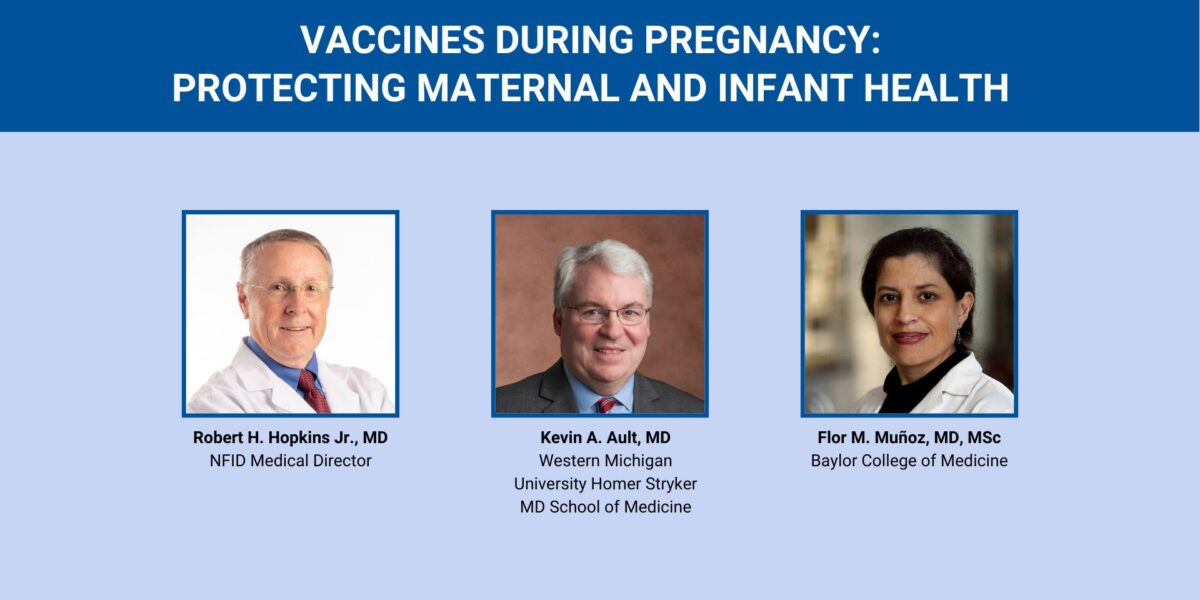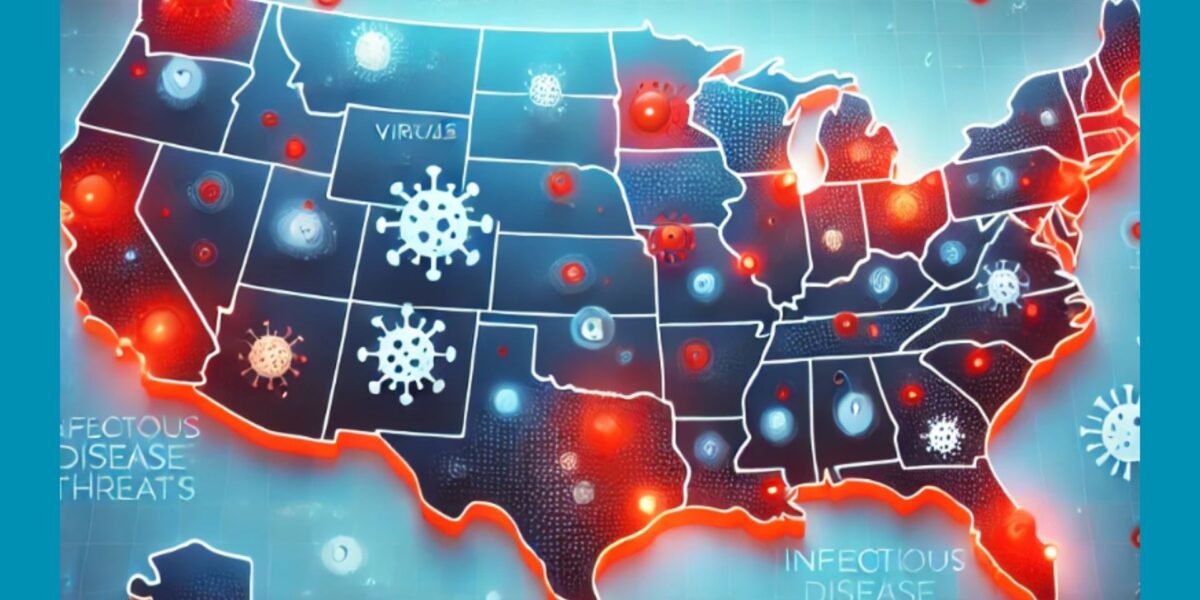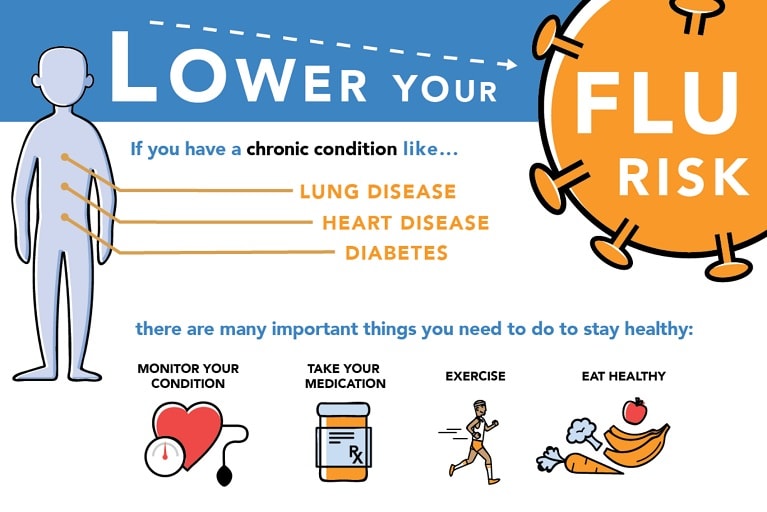
What Is Flu?
Influenza (in-floo-en-zuh), or flu, is a virus that can spread from person to person. It can cause mild symptoms or can make people feel very sick, causing serious problems that can lead to hospitalization and even death. Even healthy children and adults can get very sick from flu.
Flu spreads mostly through droplets when people cough, sneeze, or talk. Sometimes, it can spread when a person touches something that has the virus on it and then touches their eyes, mouth, or nose. A person can spread flu to others even before they know they are sick and for a week or more after they start to feel sick. People with flu are usually most contagious during the first 3 days of illness.
Bird Flu
Recent cases of bird flu reported in the US involve exposure to sick birds or dairy cows. While the current public health risk is low, the situation is being monitored carefully, and there are steps everyone can take to help protect their own health and prevent the spread of disease:
- Avoid contact with sick or dead birds or other animals
- Do not drink raw (unpasteurized) milk
- Eat meat or poultry only if it has been properly handled and cooked
- If you are in contact with potentially sick birds or other animals, use personal protective equipment including masks and gloves, and wash your hands with soap and water afterward
- If you had contact with potentially sick poultry or other animals, watch for symptoms and contact a trusted healthcare professional as soon as possible for guidance regarding testing and/or treatment
Burden
While the numbers vary, each year in the US, millions of people get sick from flu, hundreds of thousands are hospitalized, and tens of thousands die from flu and related complications each year. Flu also affects employers and businesses, costing an estimated $11.2 billion in direct and indirect costs in the US annually. Vaccines help prevent millions of cases of respiratory infections each year.
| The Centers for Disease Control and Prevention (CDC) has classified the 2024-2025 flu season as high severity overall across all ages. According to preliminary estimates, there have been at least 47 million flu-related illnesses, 21 million medical visits, 610,000 hospitalizations, and 27,000 deaths, including 260 pediatric deaths during the 2024-2025 flu season. |
Symptoms
Flu is not just a common cold. It usually comes on suddenly, and people with flu may have some or all of the following symptoms (think F.A.C.T.S.):
- Fever
- Aches (muscle, body, and headaches)
- Chills
- Tiredness (fatigue)
- Sudden onset
- Cough, runny or stuffy nose, and/or sore throat
- Vomiting and diarrhea (more common in children than adults)
Prevention
The best way to prevent flu and protect against serious illness is to get a flu vaccine every year. The Centers for Disease Control and Prevention (CDC) recommends that everyone age 6 months and older get vaccinated annually. The best time to get vaccinated is in the fall, before influenza viruses start spreading in your community, but getting vaccinated any time throughout the season is still beneficial.
Flu vaccines are updated each year to protect against the influenza viruses expected to spread during the upcoming season. Flu vaccines can vary in how well they work, but even when flu vaccination does not prevent infection completely, it can make the illness milder and prevent serious complications. For more than 50 years, hundreds of millions of people in the US have safely received seasonal flu vaccines.
2024-2025 Respiratory Season
- 2024-2025 flu vaccines are all trivalent and help protect against 3 types of influenza viruses: H1N1, H3N2, and B/Victoria
- High-dose and adjuvanted inactivated flu vaccines are acceptable options for people age 18-64 years who have had solid organ transplants and take immune-suppressing medication, with no preference over other age-appropriate inactivated or recombinant influenza vaccines
View CDC Flu Vaccination Recommendations for the 2024-2025 US Season
Treatment
Annual flu vaccination is the best way to prevent flu. While antiviral drugs are not a substitute for annual flu vaccination, they can serve as an additional line of defense. CDC recommends that all individuals who are hospitalized, severely ill, or at high risk for developing serious flu-related complications should be treated with antiviral drugs immediately if flu is suspected.
Treatment of flu with antiviral drugs can make symptoms milder, shorten the duration of illness by 1-2 days, and prevent serious complications, like pneumonia. Antivirals work best when taken within 48 hours of getting sick, but they can still help if taken later. Healthcare professionals may treat patients based on clinical judgment, local flu activity, and patient conditions.
Learn more about treatment options
Updated July 2025
Source: Centers for Disease Control and Prevention
Key Audiences
Related Resources

Key Takeaways from 2024-2025 Respiratory Season
In this recorded webinar, NFID hosts a discussion on key takeaways from the 2024-2025 US respiratory season, with a focus on influenza (flu) and more …

Kaitlyn’s Story (Flu)
Kaitlyn was a student at the University of Florida in Gainesville when she nearly died from flu

Vaccines during Pregnancy: Protecting Maternal and Infant Health
In this recorded webinar, NFID, and partners ACOG and NCfIH, host a webinar discussion on strategies to help prevent infectious diseases and increase uptake of recommended vaccines during pregnancy
Related Posts

News Round-Up: Infectious Disease Threats
According to NFID website poll, there are several worrisome infectious disease threats. Read recent news on topics of greatest concern, including avian influenza (bird flu), measles, and respiratory syncytial virus (RSV) …

Vaccines and Heart Health: A Vital Connection
Heart disease can increase the risk of serious or fatal complications from respiratory diseases including COVID-19, flu, and RSV

Harnessing the Power of Local Data
NFID dashboard aims to empower stakeholders with hyperlocal data to increase US adult respiratory vaccine uptake






